TransLife to Host Two Halloween Events.
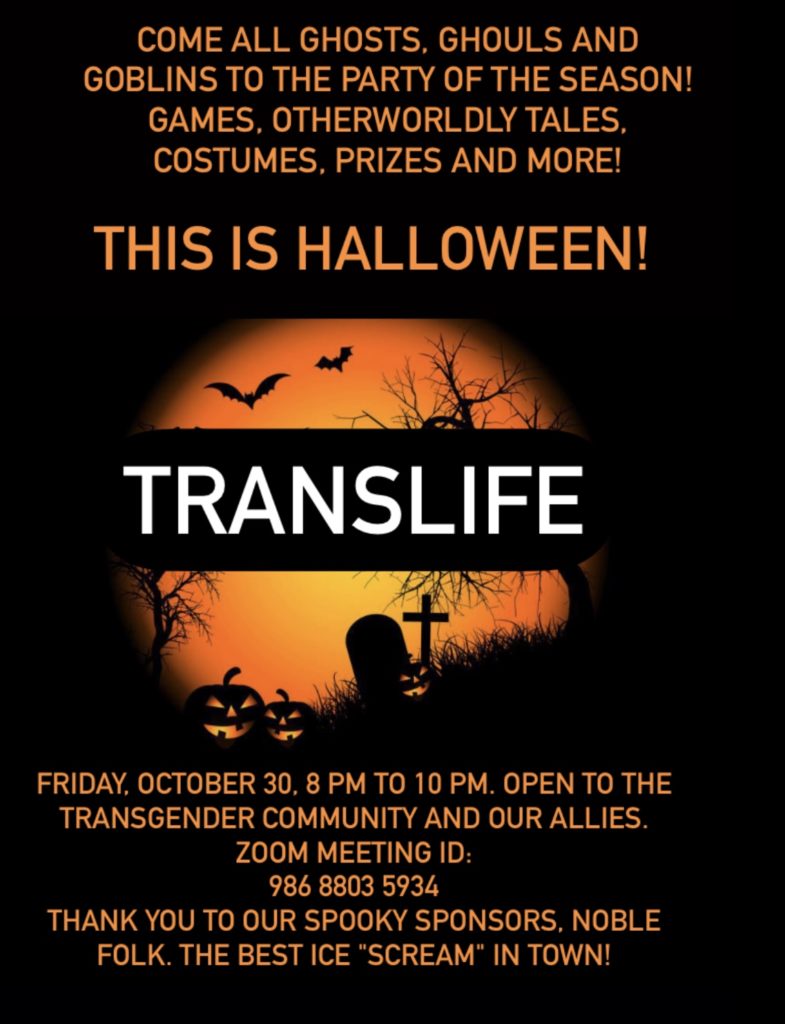
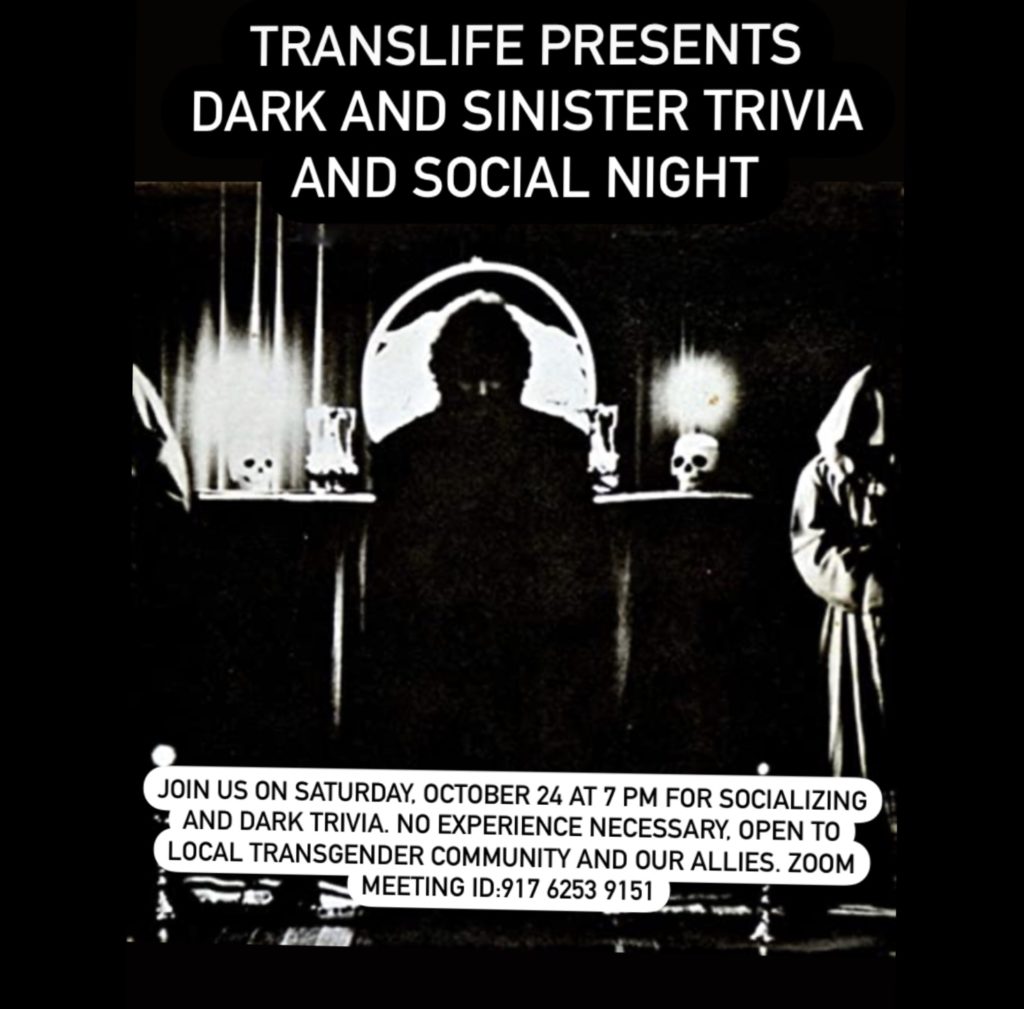
National Coming Out Day has been observed annually on Oct. 11 for more than three decades. The first such celebration was held in 1988 on the one-year anniversary of the 1987 March on Washington for Gay and Lesbian Rights, which reportedly drew 200,000 protesters to the nation’s capital.
In honor of National Coming Out Day 2020, here are just some of the many notable LGBTQ coming-out stories so far this year.
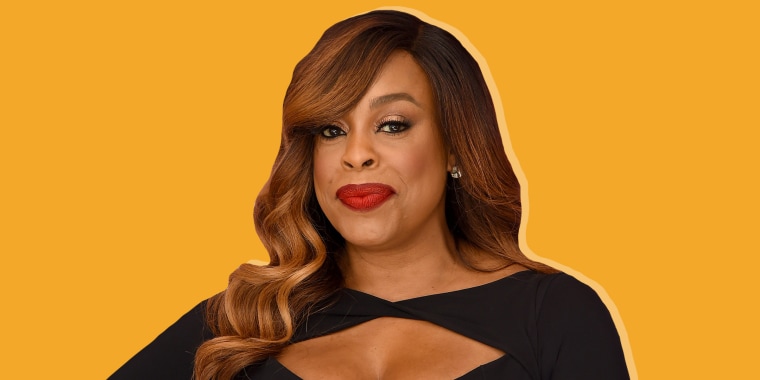
Comedian and actor Niecy Nash broke the internet this past summer when she not only came out, but she also introduced her new wife to the world.
The “Claws” and “Reno 911” star announced her marriage to musician Jessica Betts in August, sharing a joyful photo of herself and Betts walking down the aisle after just saying, ”I do.”
But Nash, who had previously been married to men before, revealed that while she may have shocked fans with her announcement, she did not perceive it as coming out per se.
“I don’t feel like my marriage is my coming out of anywhere, but rather a going into myself and being honest about who I love,” Nash told People shortly after tying the knot. “And I’m not limiting myself on what that love is supposed to look like.”

Aaron Schock, a former Republican congressman known for supporting anti-LGBTQ legislation, came out as gay in an Instagram post in March.
“The fact that I am gay is just one of those things in life in need of explicit affirmation, to remove any doubt and to finally validate who I am as a person,” Schock, who had dodged rumors about his sexuality while in Congress, wrote. “In many ways, I regret the time wasted in not having done so sooner.”

“Riverdale” star Lili Reinhart came out as bisexual in June, opening up about a part of her life she had never shared before with her fans.
“Although I’ve never announced it publicly before, I am a proud bisexual woman,” the actor wrote in an Instagram Story paired with a flyer for an LGBTQ+ for Black Lives Matter protest taking place in West Hollywood, California.
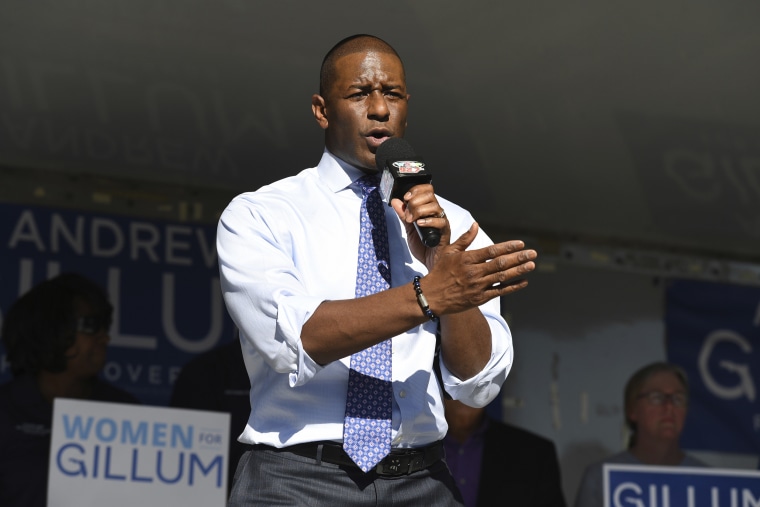
Andrew Gillum, the former mayor of Tallahassee, Florida, came out as bisexual in September during an interview with talk show host Tamron Hall.
“You put it out there whether or not I identify as gay, and the answer is I don’t identify as gay, but I do identify as bisexual,” Gillum said.
It was the first time the 2018 Democratic nominee for governor in Florida had spoken publicly about his sexuality.
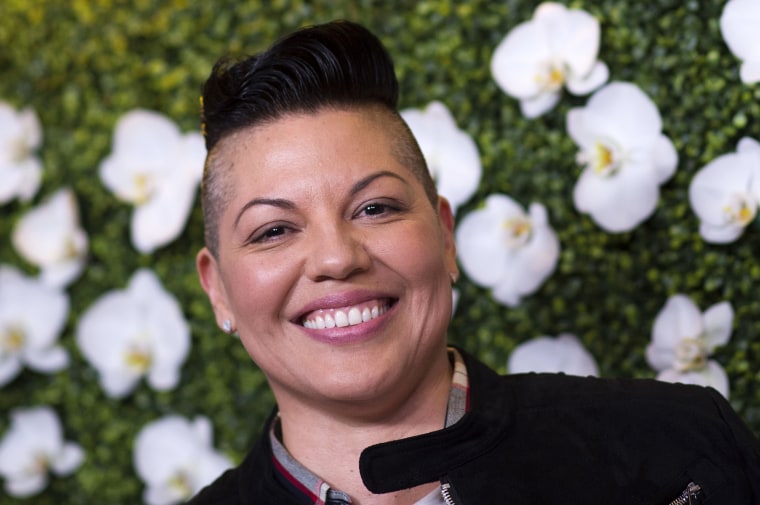
Best known for playing Dr. Callie Torres on “Grey’s Anatomy,” Sara Ramirez came out in August as gender nonbinary. In a post shared on Instagram, the Tony Award-winner said, “In me is the capacity to be” everything from a “girlish boy” to a “boyish girl.”
Ramirez added the hashtag #nonbinary to the caption of their post and updated their bio on social media accounts to read “non-binary human.” Their bio also states that they use both she/her and they/them pronouns.

French-Canadian actor François Arnaud, best known for his role on Showtime’s period drama “The Borgias” and his appearance in the award-winning series “Schitt’s Creek,” came out as bisexual in an Instagram story shared just before Bi Visibility Day, which is celebrated on Sept. 23.
Arnaud said he wanted to share his story to help fight “assumptions of straightness” and bisexual erasure.
“Last week, I was chatting with work friends, and as I brought up a trip I’d taken with an ex-girlfriend, I asked myself — for the ten-thousandth time — how to tell such a story without making it seem like that was the whole story of me,” he wrote. “I’m sure many bisexual guys feel the same and end up doing as I did: letting other people’s assumptions of straightness stand uncorrected.”

Actor and activist Jameela Jamil came out in February following criticism about her being cast in a new HBO Max voguing competition series, which some social media users said “belongs to queer people.” Following the backlash, “The Good Place” star came out as queer in a lengthy statement posted on her Twitter account.
“This is why I never officially came out as queer,” she wrote. “I kept it low because I was scared of the pain of being accused of performative bandwagon jumping, over something that caused me a lot of confusion, fear and turmoil when I was a kid.”
Born to a Pakistani mother and Indian father, Jamil said she struggled for many years to “officially” come out because of fear that she wouldn’t be accepted in the South Asian community.
“It’s also scary as an actor to openly admit your sexuality, especially when you’re already a brown female in your thirties,” she wrote. “This is absolutely not how I wanted it to come out.”

Popular YouTube creator and makeup artist Nikkie de Jager, who is also known as Nikkie Tutorials, revealed in January that she is a transgender woman to her more than 12 million YouTube followers, saying the move was prompted by attempted blackmail.
While she lamented the opportunity to reveal her journey on her own terms, de Jager said she was coming out publicly to “tak[e] back my own power.”
“I can’t believe I am saying this today to all of you, for the entire world to see, but damn it feels good to finally do it. It’s time to let go and be truly free,” de Jager said in the video. “When I was younger I was born in the wrong body, which means that I am transgender.”

Rosario Dawson officially came out during a wide-ranging interview in February, where she clarified that a 2018 Instagram post about Pride, in which she stated that she was “sending love” to her “fellow LGBTQ+ homies,” was misinterpreted.
“People kept saying that I (came out) … I didn’t do that,” she said. “I mean, it’s not inaccurate, but I never did come out come out. I mean, I guess I am now.”
Dawson did not specify how she identifies, but she added that she “never had a relationship in that space, so it’s never felt like an authentic calling to me.”
In 2019, it was confirmed that Dawson was dating Sen. Cory Booker, D-N.J., and in August it was reported that the two were moving in together.

During LGBTQ Pride Month in June, “Orange Is the New Black” star Taylor Schilling confirmed to fans that she was in a relationship with a woman.
The actor re-shared a photo to her Instagram story that musician and artist Emily Ritz had previously posted of them together with the heart-emoji-filled message, “I couldn’t be more proud to be by your side @tayjschilling “Happy Pride!”
In a 2017 interview with Evening Standard Magazine, Schilling said, “I’ve had very serious relationships with lots of people, and I’m a very expansive human. There’s no part of me that can be put under a label. I really don’t fit into a box — that’s too reductive.”

Best known for playing Tracy Turnblad in the 2007 cult classic film “Hairspray,” actor Nikki Blonsky came out as gay in June, LGBTQ Pride Month, during a festive TikTok video that showed her dancing and lip-syncing to Diana Ross’ 1980 hit “I’m Coming Out.”
“Hi, it’s Nikki Blonsky from the movie I’m Gay! #pride #imcomingout #hairspray,” the Golden Globe nominee captioned the clip.
In an Instagram post shared in June amid nationwide protests against racial injustice, “Jurassic World: Fallen Kingdom” actor Justice Smith came out as queer and revealed he was dating a man.
“Nicholas Ashe and I protested today in New Orleans,” Smith wrote. “We chanted ‘Black Trans Lives Matter’ ‘Black Queer Lives Matter,’ ‘All Black Lives Matter.’ As a Black queer man myself, I was disappointed to see certain people eager to say Black Lives Matter, but hold their tongue when Trans/Queer was added.”
After his initial post, Smith addressed the reaction from his fans and followers, tweeting, “yo tf i didn’t come out, y’all came in.
A few weeks after boyfriend Justice Smith came out publicly on Instagram, “Queen Sugar” actor Nicholas Ashe penned his own heartfelt note on Instagram to Smith.
“justice— you have been the author of all my recent smiles. you make me feel safe. seen. heard. inspired. admired. returning the favor has been my favorite adventure,” Ashe wrote in August. “it’s difficult to fully encapsulate my gratitude, but here’s an Instagram post to help me try. happy birthday, beautiful man. i love you most of all. thank you for all this good.
Soccer star Quinn, who represented Canada at the 2019 FIFA Women’s World Cup, publicly came out as transgender with a post on Instagram in September. In it, Quinn — who uses they/them pronouns and now goes by just their last name — discussed the difficulty of coming out publicly, adding important tips for the cisgender community on how to be a better ally to the transgender community.
“Coming out is HARD (and kinda bs),” Quinn, who plays for Washington state’s OL Reign team in the National Women’s Soccer League, wrote. “I know for me it’s something I’ll be doing over again for the rest of my life. As I’ve lived as an openly trans person with the people I love most for many years, I did always wonder when I’d come out publicly.
Rapper Da Brat came out publicly in March, confirming her relationship with Kaleidoscope Hair Products CEO Jesseca Dupart in a tearful Instagram post celebrating an early birthday gift.
“I’ve always been a kind of private person until I met my heart’s match who handles some things differently than I do,” she wrote. “I have never experienced this feeling. It’s so overwhelming that often I find myself in a daze hoping to never get pinched to see if it’s real so I can live in this dream forever.”https://www.instagram.com/p/B-MpOdjnD59/embed/captioned/?cr=1&v=8&wp=1116&rd=https%3A%2F%2Fwww.nbcnews.com&rp=%2Ffeature%2Fnbc-out%2Fnational-coming-out-day-20-people-who-came-out-2020-n1242833#%7B%22ci%22%3A3%2C%22os%22%3A1450%2C%22ls%22%3A1002%2C%22le%22%3A1029%7D
Actor J. August Richards, best known for his role on “Agents of S.H.I.E.L.D.,” publicly came out as gay in April when discussing his role on the NBC series “Council of Dads,” where he portrayed Dr. Oliver Post, a married gay black man and father.
“If I think about why I even got involved in this industry, it was really to combat oppression,” he told his castmate Sarah Wayne Callies during an Instagram Live interview. “I knew how I was affected by the people of color I saw on television, or that I didn’t see on television.”
“Honestly, it required me to show up fully in a way that I don’t always when I’m working,” he said of his role on “Council of Dads.” “I knew that I could not portray this gay man honestly without letting you all know that I was a gay man myself … I’ve never done that with the people that I’ve worked with.
Viral sensation Rebecca Black came out as queer and revealed she had previously dated a woman during an interview on the “Dating Straight” podcast in April.
“To me, the word ‘queer’ feels really nice,” the “Friday’ singer said. “I have dated a lot of different types of people, and I just don’t really know what the future holds. Some days, I feel a little more on the ‘gay’ side than others.”https://www.youtube.com/embed/YbNrPY-il0E
Avery Wilson, an alum of NBC’s “The Voice,” took to social media in July to share a personal message with his fans and followers: “I’m bisexual. Ok bye,” he wrote on Twitter, adding in a subsequent tweet, “From the mouth of the horse is the ultimate understanding.N
On Instagram, the singer — who competed on season 3 of the singing competition show — elaborated on his sexuality in a since-deleted post.
“In my eyes, life isn’t about being perfect. It’s about growth, evolving, setting & smashing goals and most importantly happiness and LOVE,” he wrote. “I’m all about perfecting my love of self while not being afraid to love whoever I want, however I want.”
Auli’i Cravalho, star of Disney’s “Moana” and “The Little Mermaid Live,” came out as bisexual in a since-deleted video posted to her TikTok account in April.
When lip-syncing along to Eminem’s song “Those Kinda Nights,” Cravalho recited the lyrics, “’No, I’m bi.” And when one Twitter user asked the actor, “Do u like girls?” she reportedly responded, “If I may escort you to my TikTok…”
“Outer Banks” star Madison Bailey came out as pansexual in a TikTok video shared in May, later revealing she is dating Mariah Linney, a women’s basketball star at University of North Carolina at Charlotte.
In an interview with Entertainment Tonight during LGBTQ Pride Month, Bailey said being pansexual is “basically just loving people for people, regardless of gender or any type of sexuality or any type of anything.”
From the Biden campaign:
Joe Biden believes that every human being should be treated with respect and dignity and be able to live without fear no matter who they are or who they love. During the Obama-Biden Administration, the United States made historic strides toward LGBTQ+ equality—from the repeal of “Don’t Ask, Don’t Tell” to Biden’s historic declaration in support of marriage equality in 2012 to the unprecedented advancement of protections for LGBTQ+ Americans at the federal level.
But this fight’s not over. Donald Trump and Mike Pence have given hate against LGBTQ+ individuals safe harbor and rolled back critical protections for the LGBTQ+ community. Hate and discrimination against LGBTQ+ people started long before Trump and Pence took office. Defeating them will not solve the problem, but it is an essential first step in order to resume our march toward equality.
Anthropologist Mary Gray, who said her research focusing on queer and other underrepresented communities often was seen as a “marginal topic” in some academic circles, never thought she would have access to a grant that would give her over half a million dollars with no strings attached.
All that changed when Gray was chosen as one of this year’s MacArthur Fellows, which will provide her with a $625,000 grant from the MacArthur Foundation that she can use in any way she chooses. The fellowship, commonly referred to as the MacArthur “genius grant,” counts essayist Susan Sontag, journalist Ta-Nehisi Coates, filmmaker Errol Morris and playwright Lin-Manuel Miranda among its past recipients. This year, there are 21 fellows from fields as varied as astrophysics and choreography, and each will receive the same amount of money, which will be disbursed over five years.
Gray, 51, is one of three LGBTQ MacArthur “geniuses” in the Class of 2020 who spoke with NBC News about their work, their plans for the grant money and the diversity of voices in this year’s class. She is joined by writer Jacqueline Woodson and econometrician Isaiah Andrews.
“This is for every queer kid out there,” Gray said of her selection. “The last thing I would have thought was that the work I do would be acknowledged in this way.”
Gray’s recent academic work explores how the digital economy has transformed labor, identity and human rights. Driving this research is her past research on how queer people in rural America have used the internet to form communities around their identities, which stems from her upbringing in California’s rural Central Valley. She is currently a faculty associate at Harvard University’s Berkman Klein Center for Internet and Society, while also maintaining faculty positions in the anthropology and gender studies departments at Indiana University.
Gray said she doesn’t know exactly how she’ll use her MacArthur grant money, but she said it will likely be used to help with her pandemic response network research, which is being run through Duke University’s health center to support the marginalized communities hit hardest by the Covid-19 health crisis.
The McArthur grant means Gray “can look at the projects I’m doing and the political activism I care about and feel like I can support that work and support myself at the same time.” She described the ability to pursue any direction she wants in her research as liberating, but also a reminder of the immense privilege being bestowed the grant means.
“If anything, it is galvanizing me to push people to think about who’s not supported right now,” she said. “This is a moment of solidarity. None of us really move forward if we’re not holding each other together and moving forward together.”
Andrews, 34, is a professor in Harvard’s economics department whose work explores new statistical methods to counter potential biases in the field of econometrics. Andrews, who is Black and gay, said it’s important for people to see people of color and LGBTQ people at the highest levels of his field.
“I hope that my getting this grant will help to demonstrate and show that there is room for success from a wide variety of folks in the economics profession,” the Massachusetts native said. “While the profession is not as diverse as it should be and has a lot of work to do, to its credit, is at least it’s trying to do some of that work.”
As he continues his research, Andrews said having a secure source of additional income for the next five years is thrilling. Like Gray, he does not have an immediate plan for what the money will be used, but he said he hopes it will put a “spotlight on the importance of thinking carefully about statistical methods” that are developed and can contain hidden biases.
Woodson, 57, said she already knows how her MacArthur grant money will be used: to expand an artist residency program she runs in Brewster, New York, for people of color, called Baldwin for the Arts. The author of numerous children’s books, a memoir and adult fiction novels, the Brooklyn resident was also one of the founding faculty members of Vermont College’s MFA in Writing for Children and Young Adults.
The goal of the residency is to give writers and visual artists a community and safe space to invest in their work and the time to grow and create. The residency was started with a grant from the Swedish government and has slowly been expanding through personal contributions by Woodson. Now, with the grant money, the long-term, expanded dreams of the residency feel closer than ever, she said.
“I learned very young what it meant to be in a space where I felt 100 percent inside my body, and be around people I didn’t have to explain to,” Woodson said. “I think that a lot of us do know what we need, but can’t even fathom it. A space like this would allow people to start thinking about the importance of self-care and this kind of attention to creation of their own art.”
A 33-year-old Georgia woman has become at least the 31st transgender or gender-nonconforming person to die by violence in the U.S. this year, according to LGBTQ advocacy group Human Rights Campaign.

Felycya Harris was shot and killed Saturday in Meadowbrook Park in Augusta, Georgia. On Monday, the Richmond County coroner classified her death as a homicide.
Human Rights Campaign, which has been tracking transgender deaths since2013, said it has never seen such a high number of deaths at this point in the year, with more additional deaths likely unreported or misreported.
“More accurate reporting may be a factor in the high number of deaths that we have tracked,” Tori Cooper, director of community engagement for HRC’s Transgender Justice Initiative, told NBC News. “But we are also at an extremely vitriolic period, where hate is fueled even from our nation’s highest office.”
The figure is all the more disturbing given the global lockdowns during the pandemic. Trans and gender-nonconforming people experience higher levels of violence from people they know, Cooper added, and may not be able to find refuge.https://dataviz.nbcnews.com/projects/20200714-trans-homicide-annual-barchart/index.html?initialWidth=560&childId=embed-20200714-trans-homicide-annual-barchart&parentTitle=Killings%20of%20transgender%20Americans%20reach%20all-time%20high%2C%20rights%20group%20says&parentUrl=https%3A%2F%2Fwww.nbcnews.com%2Ffeature%2Fnbc-out%2Fkillings-transgender-americans-reach-all-time-high-rights-group-says-n1242417
“These are especially dangerous times and resources for help are limited at best,” she said. “We need to ensure that transgender and gender non-conforming people have equal and safe access to any resources they may need to thrive — at all times, but especially during this pandemic.”‘Everybody’s going to remember Felycya’
Harris, an interior decorator, worked in a furniture store and taught dance.
“To know Felycya is to love her smile, her giving spirit,” said friend Sandra Taylor, who launched an online fundraiser to help cover funeral expenses.
“Everybody’s going to remember Felycya,” another friend, Ricola Collier, told local NBC affiliate WRDW-TV. “That laugh. The smile — the smiles. The talks. The arguments. The attitudes. Everybody is going to remember who Felycya Harris is. Nobody would ever forget who that is.”
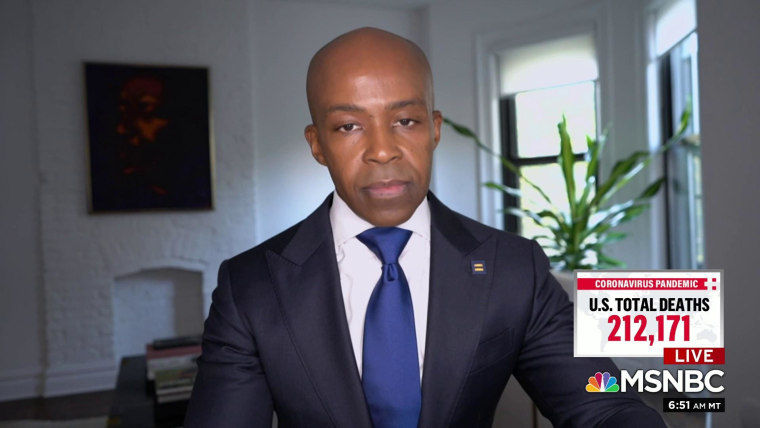
On Tuesday, HRC President Alphonso David said Harris’ passing marked a “grim milestone” in a year already full of tragedy. It put 2020 on par with 2017’s count for the highest number of transgender killings, with nearly three months still left to go.
Six transgender women were killed in July alone, as was nonbinary activist Summer Taylor, making it the deadliest month to date.
“This epidemic of violence, which is particularly impacting transgender women of color, must and can be stopped,” David said in a statement. “We must work to address the factors that underpin this culture of violence and openly discuss how the intersection of racism, sexism, homophobia, biphobia and transphobia work to deprive transgender and gender-nonconforming people of equal access to opportunity and necessities like employment, housing and health care.”
Collier said she just wants justice for Harris’ death. Georgia passed a hate-crime law in June, but it does not expressly include gender identity.
“The only thing we got left now is just the memories and the pictures, and the videos,” she told WRDW-TV, which reported that police are still searching for a suspect. “Since the day I found out what happened, I go back and watch the videos every day,”
Harris is the fourth trans person to die by violence in the U.S. in just the past three weeks, according to HRC. Her murder comes just four days after the shooting death of Michelle Michellyn Ramos Vargas, a transgender woman in Puerto Rico.
Ramos, a nursing school student, was found the morning of Sept. 30 along an isolated road near a farm in San German, a town of about 35,000 on the southwestern part of the island.
She had been shot several times in the head, The Associated Pressreported. Police are not ruling out that the killing was a hate crime.‘Transgender women in Puerto Rico are very scared’
Ramos’ death was the latest in a string of brutal killings of transgender people in Puerto Rico. So far, six have been reported this year, though there may be more.
“Transgender women in Puerto Rico are very scared,” said Arianna Lint, CEO of Arianna’s Center, which works to uplift trans women of color on the island. “We’ve never seen so many deaths happen so fast.”
On April 11, Penélope Díaz Ramírez, a 31-year-old transgender woman, was beaten and hanged at a men’s prison in Bayamon.
A little more than a week later, on April 22, the charred bodies of two other trans women — Layla Peláez, 21, and Serena Angelique Velázquez, 32 — were found in Humacao inside the remains of a car that had been set on fire.
After seeing images of them with the victims on social media, the U.S. Justice Department arrested two men, Juan Carlos Pagán Bonilla, 21, and Sean Díaz de León, 19. Bonilla confessed to the killings, El Nuevo Dia reported, and the two men have become the first people in Puerto Rico to face federal hate crime charges.
In February, Neulisa Luciano Ruiz, also known as Alexa, was fatally shot after using the women’s restroom in a McDonald’s in Toa Alta. Her assailants reportedly posted video of the shooting on social media.
In March, Yampi Méndez Arocho, a 19-year-old transgender man, was shot and killed in Moca, just hours after being assaulted by an unknown woman. Arocho’s mother reportedly called the police about the assault, but it’s not clear if there was an investigation.
Transgender people in Puerto Rico have become more visible in the past year or two, making them more of a target, according to Lint. Trans women tend to avoid the police, she added, going to each other for help instead. She said the government isn’t particularly supportive and neither are gay groups.
“They created an LGBT committee to advise the government, but there’s no one transgender on it. The life of a lesbian in Puerto Rico is very different of a transgender woman of color,” Lint explained.
Pedro Julio Serrano, an LGBTQ activist in Puerto Rico, said not enough is being done to stop anti-transgender violence on the island.
“A state of emergency for gender violence has not been decreed — there is nothing,” he said in a statement on his website.
Puerto Ricans are voting for a new governor on Nov. 3, but Serrano said most of the candidates just use LGBTQ people “as a political ball to get votes from people who hate us.” Only one candidate, Alexandra Lúgaro, has said she would support LGBTQ individuals if elected, according to Serrano.
“She’s also been the only one to speak about sex workers, which is very important,” Lint says. “Because, in Puerto Rico, one of the primary financial outlets for transgender women is sex work.”
Under the rule of Vladimir Putin, authorities have declared gay men in Russia who have had children by surrogacy will face arrest for “baby trafficking”.
According to The Independent, Russian state media reported that a source within the country’s Investigative Committee compared surrogacy to baby trafficking, and insisted that it was an offence for men with “non-traditional orientation” to use their sperm for IVF.
“We plan to arrest a number of suspects, single men, and Russian citizens, who have used surrogate mothers to give birth to children,” the source added, despite the fact that surrogacy is actually legal in Russia. This plan has not been confirmed by the government.
Seven people have already been arrested in Russia on baby trafficking charges after a baby born to a surrogate mother died in a tragic cot death in January.
The baby was found in a flat in Moscow with three other children, all believed to have been conceived by surrogate, and two nannies.
The children were being cared for by nannies while their parents organised paperwork to take them back home. The baby was found to have died by natural causes.
But Russian authorities decided that the baby died “by negligence” and that the surrogacy arrangement constituted “baby trafficking”. Medical staff and lawyers involved in the surrogacy were arrested.
Lawyer Igor Trunov, who is representing the children’s parents, told The Independent: “Babies, unfortunately, do die… Whatever you do, you should not believe state investigators when they say they are acting out of interests of child welfare.
“They have chosen to send three eleven-month-old kids to a children’s psychiatric facility.”
The babies’ parents are suing the government in Russia for “abducting” their children, who are legally recognised as foreign citizens.
But government investigators are playing the blazing anti-LGBT+ sentiment in Russia, said Trunov, by linking baby trafficking to gay men.
Stars you didn’t know are LGBT+Celebs you didn’t know have an LGBT siblingThe stars who went gay for pay
He said: “They want to connect baby trafficking to the idea of sexual orientation, knowing how that resonates with the wider public. They understand no one is going to stand up for gays.”
Trunov added that he had no doubt a “political order” was driving the investigators’ sudden interest in gay men a surrogacy.
Russian president Vladimir Putin has consistently taken aim at the country’s LGBT+ community, stirring up hatred among his most loyal supporters, members of the Russian Orthodox Church, and leaving LGBT+ rights groups outside of Russia alarmed in the ways he is targeting queer people.
In 2013, Putin oversaw the introduction of the country’s infamous “gay propaganda” law, which bans so-called “propaganda of non-traditional sexual relationships” among minors.https://lockerdome.com/lad/13296932562903654?pubid=ld-5883-3439&pubo=https%3A%2F%2Fwww.pinknews.co.uk&rid=www.pinknews.co.uk&width=572
Human rights monitors say that the law has been widely exploited in Russia to clamp down on freedom of expression for LGBT+ people.
During the recent constitutional referendum which allowed Putin to extend his rule beyond the 2024 cut-off, Putin’s campaign relied heavily on taking away LGBT+ rights, from effectively erasing trans people from existence to a constitutional ban on marriage equality.
Half of trans and non-binary people want to abolish legal gender categories altogether, new research has found.
A University of Exeter study into potential reforms to the Gender Recognition Act, which comes after the long-delayed results of a 2018 public consultation on gender recognition were finally published on 22 September, found that half of trans and non-binary respondents wanted to abolish legal gender categories by ending the practice of recording sex at birth.×
Exeter researchers exploring the potential GRA reforms by surveying trans and non-binary people found that 88 per cent were in favour of a third additional gender option for a Gender Recognition Certificate, followed by a multi-gender system (59.4 per cent) and removing the system entirely by ceasing to record sex at birth (49.6 per cent).
Introducing an additional third option was particularly popular with non-binary people, with zero non-binary people opposed to this proposal.
The 2018 Gender Recognition Act (GRA) consultation attracted more than 108,000 responses, with 80 per cent of respondents in favour of de-medicalising the process of obtaining a GRC, and three-quarters in favour of dropping a requirement for trans people to provide “evidence” of living in their chosen gender.ADVERTISING
In a ministerial statement published alongside the consultation, equalities minister Liz Truss said that she would digitise the GRA process and reduce the fee to a “nominal” amount but signalled that broader reforms to the GRA will not go ahead.
Mollie Gascoigne, a PhD Candidate at Exeter Law School who is leading the research, said: “The government’s proposals to reduce the application fee is welcome as the current cost has posed a significant barrier to many people hoping to access legal gender recognition.
“However, to substantively increase the number of people applying for legal gender recognition and to make the system more accessible particularly for non-binary people, these findings suggest that further reform is still needed to address the current lack of non-binary gender recognition and the requirement of gender dysphoria.”
Stars you didn’t know are LGBT+Celebs you didn’t know have an LGBT siblingThe stars who went gay for pay
A total of 276 transgender and non-binary people completed a survey about the Gender Recognition Act 2004 and 21 non-binary people were also interviewed for the research, which is part of the Gender Recognition and Reform (GRR) Project at the University of Exeter Law School.
The research found that trans and non-binary people would be more likely to use the GRA if the need for a medical diagnosis of gender dysphoria was removed.
Half of trans people who took part in a survey opposed the gender dysphoria requirement, as did 80.7 per cent of non-binary people. Non-binary participants were more than two times more likely to report that removing the gender dysphoria requirement would make them more likely to apply for a GRC.
Respondents to the survey also said they had had poor experiences with medical professionals, found the need for a mental diagnosis stigmatising and didn’t agree that legal gender should be defined according to a medical model.
President Donald Trump’s nomination of Judge Amy Coney Barrett to the Supreme Court to succeed Justice Ruth Bader Ginsburg last month ignited fears of an increasingly conservative court rolling back recently gained LGBTQ rights.
Fuel was then added to the fire on Monday when two of the court’s conservative justices, Clarence Thomas and Samuel Alito, mounted a fresh attack on the landmark 2015 decision Obergefell v. Hodges, which made same-sex marriage legal across the United States.
“By choosing to privilege a novel constitutional right over the religious liberty interests explicitly protected in the First Amendment, and by doing so undemocratically, the Court has created a problem that only it can fix,” Thomas, joined by Alito, wrote. “Until then, Obergefell will continue to have ‘ruinous consequences for religious liberty.’”
“The Court could significantly water down what marriage means for LGBTQ couples across the nation to what the late, great Justice Ginsburg, called ‘skim milk marriage.'”
HUMAN RIGHTS CAMPAIGN PRESIDENT ALPHONSO DAVID
The four-page statement followed the Supreme Court’s rejection of an appeal from Kim Davis, a former Kentucky county clerk who made headlines after she denied marriage licenses to same-sex couples following the 2015 Obergefell decision. Davis, a Christian, had cited her religious beliefs, and her lawyers argued to the Supreme Court that her case came down to “whether the law forces an all-or-nothing choice between same-sex marriage on the one hand and religious liberty on the other.”
While the Court ruled unanimously against hearing her appeal on technical grounds, Thomas and Alito used the opportunity to issue a blistering critique of Obergefell, stating that Davis “may have been one of the first victims of this Court’s cavalier treatment of religion in its Obergefell decision, but she will not be the last.”

Advocacy groups were quick to hit back at the two conservative justices, with the Human Rights Campaign, the country’s largest gay rights group, saying in a statement that Thomas and Alito had “renewed their war on LGBTQ rights and marriage equality, as the court hangs in the balance.”
During a call with reporters Monday afternoon hosted by the campaign, Jim Obergefell, the plaintiff in the 2015 case, called the remarks by Thomas and Alito “deeply disturbing and upsetting.”
“They signal that they are still willing to roll back progress, to rip rights away from LGBTQ+ people, and that if given the chance they would work to overturn the right to marriage that I and so many activists and advocates have fought for,” Obergefell said. “Justices Thomas and Alito seem to imply that freedom of religion carries more weight, is more important than all other rights.”
On that same call, HRC President Alphonso David, a civil rights lawyer, said the justices’ statement “made clear that the war on marriage equality against the lives of same-sex couples is alive and well.”
“This outlook and the language in the Thomas and Alito statement is doubly troubling, as the court could soon be reshaped in a more dangerous anti-LGBTQ image if Amy Coney Barrett is confirmed by the United States Senate,” David said. “The Court could significantly water down what marriage means for LGBTQ couples across the nation to what the late, great Justice Ginsburg, called ‘skim milk marriage.’”
The Human Rights Campaign and other LGBTQ rights groups have been sounding the alarm over Barrett since before she was nominated on Sept. 26. The day before, the campaign warned in a statement that Barrett “would work to dismantle all that Ruth Bader Ginsburg fought for during her extraordinary career.”
The campaign included a laundry list of concerns, including Barrett’s defense of the justices who dissented in Obergefell v. Hodges, as well as her arguing, during a lecture at Jacksonville University in Florida, that reading Title IX protections to include transgender people is a “strain on the text,” and, in that same lecture, referring to trans women as “physiological males.”
That same day, Sept. 25, Lambda Legal came out against the Barrett nomination, calling it “rushed” in a statement. The organization also noted Barrett had once written a law review article arguing Supreme Court cases could be broken down into two categories: “precedent and superprecedent,” with the second representing decisions that are harder to overturn. It added that when asked by Sen. Sheldon Whitehouse, D-R.I., during her 2017 nomination hearing for the 7th U.S. Circuit Court of Appeals, Barrett wouldn’t answer in which category she would place the issue of marriage equality, or any other particular cases, for that matter.
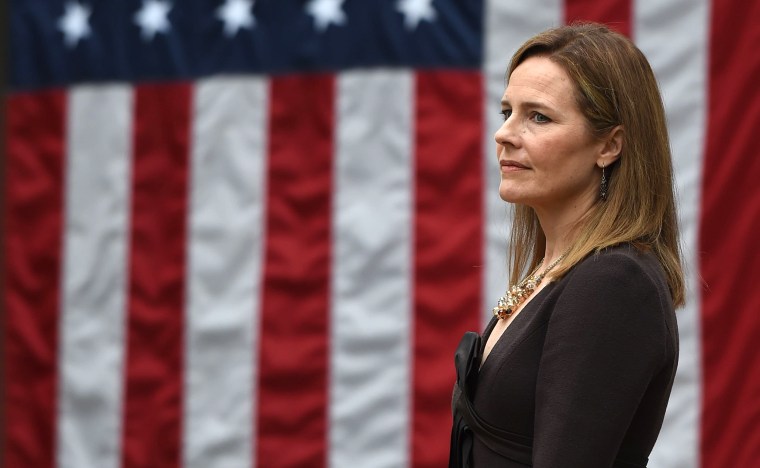
However, not everyone in the LGBTQ community is so concerned. Brad Polumbo, a journalist who is gay, recently wrote an article for The Washington Examiner in which he argued that concerns regarding Barrett are overblown. He recalled the upset within the LGBTQ community over Justice Neil Gorsuch’s nomination, and — pointing to Gorsuch’s vote in favor of gay and transgender rights in June in Bostock v. Clayton County, Georgia — argued that those fears have proven unfounded.
Polumbo also said he believes LGBTQ rights should be gained through Congress and not through the courts.
“I don’t think that a judge has to always rule in favor of the best outcome for LGBT interests,” Polumbo told NBC News. “They have to rule with what the law says … and that’s what Amy Coney Barrett says specifically she will do.”
“She says she will not impose her personal beliefs on the law, and she will rule for the law as it is written, and I believe her because she has a track record of doing that, as do many of these conservative justices,” he added.
When it comes to the Obergefell v. Hodges decision, Paul Smith, a professor at Georgetown Law School, said, “There are a number of reasons why even a very conservative court is probably not going to overrule it.”
Smith successfully argued the landmark 2003 Supreme Court case Lawrence v. Texas, which decriminalized same-sex sexual activity among consenting adults, striking down sodomy laws in Texas and a dozen other states. He said he’s confident we will not see a return of such laws, as even those not as explicitly anti-gay as the one at the center of Lawrence v. Texas “were just a way of regulating same-sex conduct,” which he sees both the high court and public opinion as having advanced beyond.
Smith, who said the “precedent versus superprecedent” argument is a solely political one with no real legal basis, was also quick to note, regarding the Obergefell decision, that the many same-sex married couples across the U.S. cannot be unmarried. There are currently more than a half million households made up of same-sex married couples in the country, according to U.S. Census Bureau data released last month. To go back on gay marriage now, Smith said, would cause such a “political cataclysm that the court would be very reluctant to take on such an unpopular position.”
Jon Gould, a professor at Arizona State University’s School of Criminology and Criminal Justice, agrees. He noted that polling data shows public support for same-sex marriage has continued to rise, and that the Supreme Court’s decisions on social issues tend to hew closely to public opinion.
“As much as we say, ‘They don’t consider politics,’ of course the justices consider where the public is on particular issues,” Gould said. “The polling has just moved so fast and this issue, there is no way they’re going back from that.”
According to Gallup’s annual Values and Beliefs poll, conducted in May, 67 percent of Americans said same-sex marriage should be recognized by law as valid, matching an all-time high. When Gallup first polled Americans on the topic of gay marriage, in 1996, only 27 percent said they were in favor of it.
Gould also noted there was an increase in support for workplace protections for LGBTQ people, which the court recently ruled in favor of in June’s Bostock decision, determining that Title VII of the Civil Rights Act of 1964 protects against workplace discrimination based on sexual orientation and gender identity.
Many were surprised when Gorsuch, a Trump appointee, voted in favor of those protections, and in fact wrote the decision.
Gould argued that many “misread Gorsuch,” whom he called “not your traditional social conservative” but rather a “libertarian conservative,” hence his decision on that case coming through a “plain reading of a statute rather than a large constitutional exercise.”
Barrett, Gould said, “is a social conservative as well as a legal conservative,” adding that he thinks Republicans “will get exactly what they bargained on with this nominee.”
But if anti-gay laws are unlikely to make a comeback, where should gay rights activists focus their attention? The answer to that lies, at least in part, in the still fluid, and at times blurry, line between religious freedom and LGBTQ civil rights, according to Gould and Smith. They said they believe the main threat to LGBTQ rights under a more conservative court lies in religious exemptions, which Gould said could “blow a hole” in constitutional jurisprudence.
“That’s where her nomination is going to be a tipping point potentially, because there’s nothing about her that suggests that she will do anything other than advance that argument,” Gould said of Barrett.
As Lambda Legal noted in its September statement, Barrett has been a paid speaker at legal conferences hosted by the Alliance Defending Freedom. The conservative legal group, which has a long track record of opposing gay and transgender rights, has been deemed an anti-LGBTQ “hate group” by the Southern Policy Law Center, though the organization contests that characterization. Among its past cases is 2018’s Masterpiece Cakeshop v. Colorado Civil Rights Commission, where the Supreme Court narrowly ruled in favor of Jack Phillips, an ADF client and a Christian baker who refused to make a wedding cake for a same-sex couple.
Religious exemption, Gould warned, allows “an activist court to expand the argument to more and more things that don’t seem like they are about artistic expression.”
“The very fact that that argument exists when it comes to someone’s immutable sexual orientation makes no sense,” he said.
He added that the same argument could have been applied earlier in America’s history by white supremacists in regards to interracial marriage.
Gould also said the religious freedom argument didn’t gain traction in the Davis case because “she was performing an entirely governmental function,” without any “potential First Amendment artistic argument to employ.”
If confirmed by Election Day, Barrett would get to weigh in on Fulton v. City of Philadelphia, a case involving whether private child welfare agencies that receive taxpayer money can refuse to work with same-sex couples. How she rules there, and what arguments she uses to arrive at her decision, would offer insights into what can be expected during her time on the court, which could be decades as she is only 48.
“I would assume that she is going to be on the aggressive exemption side of those kinds of cases,” Smith said.
And while Smith posited that there might be some cause for hope on the part of LGBTQ advocates due to Gorsuch’s Bostock decision, he believes Gorsuch will likely try to distinguish between employment discrimination and issues like access to bathrooms and locker rooms, as well as participation in athletics, being decided by sex assigned at birth instead of gender identity.
Transgender rights are less well established by legal precedent, which means they are likely to be at a bigger risk of failing to advance than gay rights, Gould argued.
“The whole concept of rights are socially constructed by what people think, and the justices are following that,” Gould said. “We’re not at the point right now where trans rights are there. If we ever get to that point, you may see the court expand the rights, but we’re not, and so I just don’t see them going out on a limb for that.”
It is worth noting that the Supreme Court did rule in favor of trans worker rights, and that polling shows most Americans are opposed to discrimination in employment on the basis of sexual orientation and gender identity, although there is more opposition when it comes to sexual orientation than gender identity. Polls have additionally found a growing level of support for trans rights.
Polling also shows most Americans support allowing transgender people to serve in the military. However, bathroom access based on gender identity has been a harder sell, with a slim majority opposing such policies.
The reality of a more conservative Supreme Court has led to talk of packing the court, or adding justices, if Democrats gain control of the White House and Senate. It is an idea gaining in popularity among the left in the wake of Barrett’s nomination just weeks before the 2020 election, while President Barack Obama’s 2016 nominee, Merrick Garland, never received a Senate vote, despite being nominated 10 months before that year’s presidential election.
Both Gould and Smith suggested adding justices could be a real possibility, if Biden wins the election and the Democrats take full control of Congress. “You can put this all under the heading of: You reap what you sow,” Gould said.
Many in the LGBTQ community also fear what a Barrett nomination could mean for the Affordable Care Act (ACA), with a challenge to the landmark Obama-era legislation also set to come before the court in November.
The ACA has been especially important to the LGBTQ community, as it prohibits discrimination against LGBTQ people in health care and insurance coverage. Discrimination within the health care system has exacerbated disparities commonly found among minority groups, who face increased barriers to care.
Smith said if the court rules the ACA unconstitutional, he sees the odds of Democrats looking to add justices to the high court increasing to over 50/50.
Even without the possibility of court packing, Gould said he believes that even if religious exemptions are expanded at an aggressive rate, they “will exist for a couple generations, if that, and then a future court will close” the exemptions.
That, however, does not assuage the fears of today’s LGBTQ advocates, who fear the imminent reversal or watering down of recently won rights.
Sanay Martinez, a trans student from Louise, Texas, has been kicked out of her school until she abides by the male dress code.
With in-person teaching reopening for the autumn semester, Louise Independent School District prohibited Martinez from adhering to the school’s female dress code after she alerted officials that she is trans.×
Administrators told her that unless she cuts her hair, takes out her earrings, and dresses in accordance with the “male handbook”, she cannot return.
Martinez was just a typical student at who enjoyed her classes and loved spending time with her friends, but told ABC13 that the experience has made her feel almost like a pariah.
“It’s my senior year and I would love to go back to Louise ISD, but I don’t feel welcome at all,” she told the outlet.ADVERTISING
She and her close friend are even considering transferring to a school some 10 miles away in El Campo in protest. School officials sought to stress that as much as they “accept” Martinez, she must abide by their rules.
The 18-year-old said: “[The school administrators] don’t have to accept it, but they should respect it”.
“They told me I can’t come back until I cut my hair and take out my piercings. And I do not like that because as a female, I should follow the female handbook and not the male handbook.”
Stars you didn’t know are LGBT+Celebs you didn’t know have an LGBT siblingThe stars who went gay for pay
Due to the school’s inability to respect as well accept Martinez, she and her friend Alexis Mendoza will most likely have to be transferred to El Campo High School, in the neighbouring town of El Campo.
Mendoza said: “They’re being really disrespectful. They know [Sanay] since [she] was in Pre-K.”
She said that the school was “fine” when Martinez came out as gay, “but when [she] came out as trans, that’s when everything changed.”
The superintendent of Louise Independent School District said how they “accept” and “love” Sanay, but she must follow the rules.
Martinez continued “I’m here to tell everyone, that transgender students should be allowed for their education.
“It is their rightful purpose for them to go into the school and get their education. It doesn’t matter what race, gender or sexuality.”
A wedding photographer and a group of several Christian institutions filed two different lawsuits against Virginia officials Monday over a new law that bans discrimination against the LGBTQ community.
The lawyers representing the plaintiffs argue that the law violates their First Amendment rights and forces them to “abandon and adjust their convictions or pay crippling fines.”
The law, titled the Virginia Values Act, went into effect on July 1 and prohibits discrimination on the basis of sexual orientation or gender identity in housing, public and private employment, public accommodations and access to credit. It was the first Southern state to adopt these types of protections for the LGBTQ community. Violations could be met with fines of up to $50,000.
In one lawsuit filed in U.S. District Court in Alexandria, Loudoun County wedding photographer Bob Updegrove argues that the law forces him to photograph same-sex weddings, even though he is opposed to same-sex marriage because of his faith.
Jonathan Scruggs, a lawyer with Alliance Defending Freedom, an anti-LGBTQ legal organization representing the plaintiffs in both cases, claims the new policy places the photographer in an impossible position between promoting “views against their faith” and violating the law.
“The government cannot demand that artists create content that violates their deepest convictions,” Scruggs said in a statement posted to the Alliance Defending Freedom’s website.
In a separate suit filed in Loudoun County Circuit Court, two churches, a religious school and a pregnancy center network claim the law will force them to hire employees who don’t share their beliefs about sexual orientation and gender identity.
The U.S. Supreme Court has previously ruled that no religious organization can be required to hire someone outside their faith and they must be allowed to dismiss or hire their leaders without government interference.
“Virginia’s new law forces these ministries to abandon and adjust their convictions or pay crippling fines,” Denise Harle, another Alliance Defending Freedom lawyer, said in a statement. “Such government hostility toward people of faith has no place in a free society.”
Charlotte Gomer, a spokesperson for Virginia Attorney General Mark Herring, said he was still reviewing the lawsuits and would respond in court.
“Attorney General Herring believes that every Virginian has the right to be safe and free from discrimination no matter what they look like, where they come from, or who they love,” she said in a statement. “LGBT Virginians are finally protected from housing and employment discrimination under Virginia law and Attorney General Herring looks forward to defending the Virginia Values Act in court against these attacks.”
Equality Virginia heavily advocated for the Virginia Values Act. In a statement, Executive Director Vee Lamneck pointed to the support the law garnered from a coalition of more than 140 religious leaders in 2019.
“Protecting LGBTQ Virginians from discrimination does not threaten [religious] freedom,” Lamneck said in their statement. “That’s why people of faith across the state advocated with us in support of the Virginia Values Act—because of their deep faith—not in spite of it.”